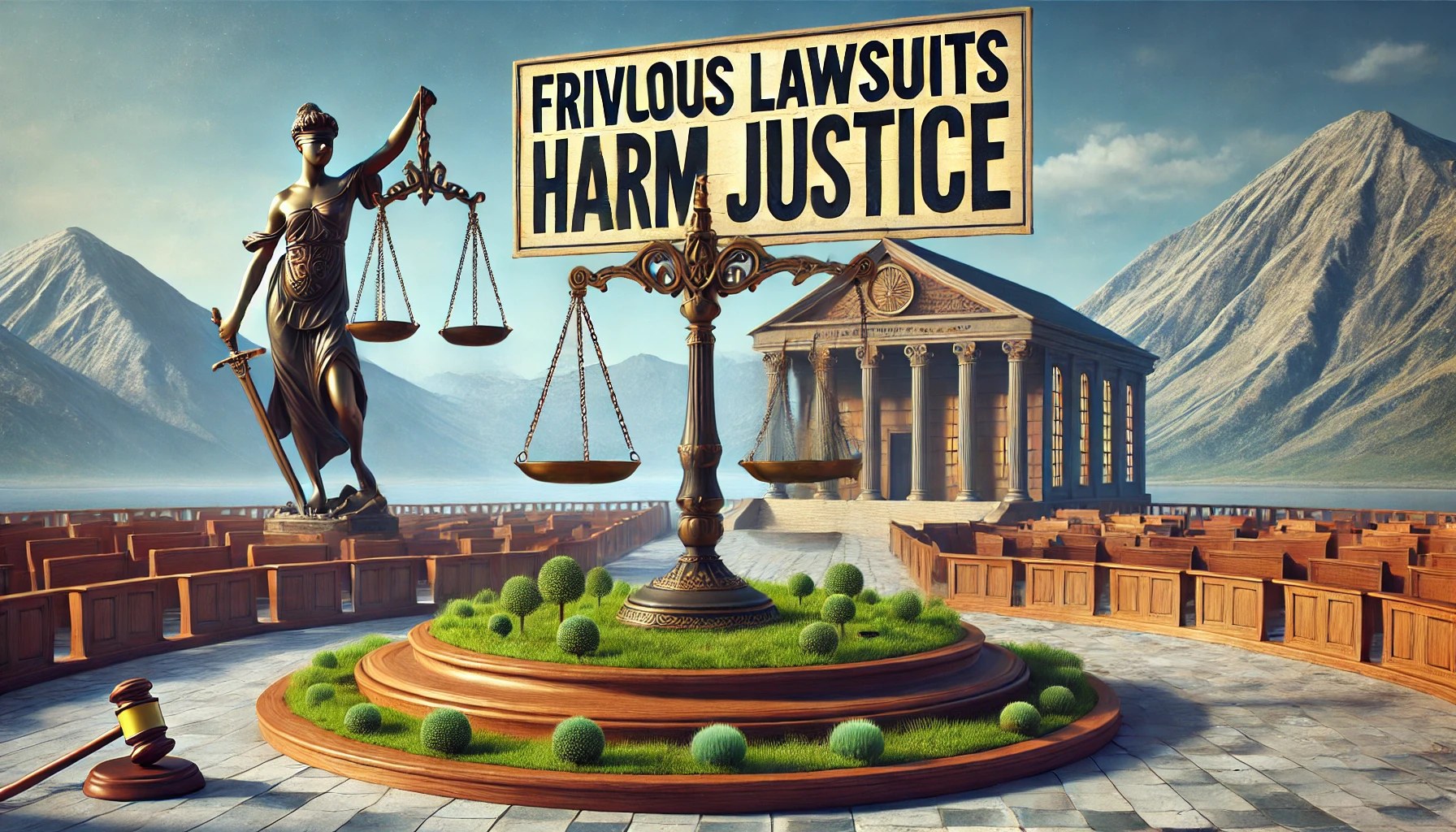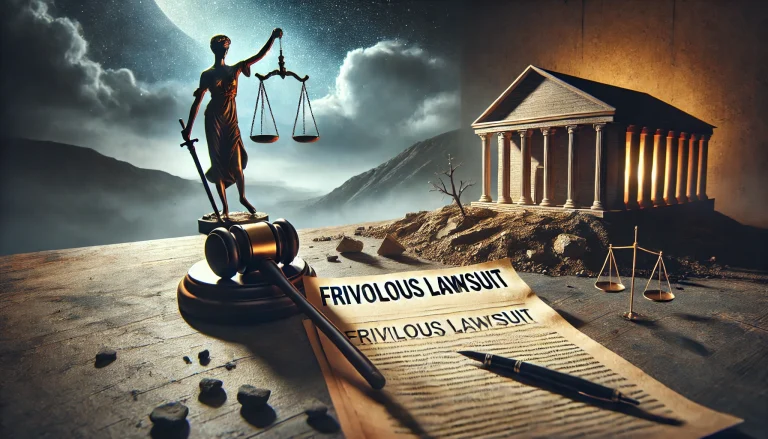Frivolous lawsuits refer to legal claims filed without any substantial evidence, factual basis, or legal merit. These lawsuits are often used as a tool to harass, burden, or exploit the defendant rather than seeking genuine justice. The importance of addressing frivolous lawsuits lies in ensuring the integrity of the judicial system, preventing abuse of resources, and protecting individuals from unnecessary legal battles. Recognizing these lawsuits early can save both time and money for everyone involved in the legal process.
Characteristics of Frivolous Lawsuits
Frivolous lawsuits typically exhibit several key characteristics:
- No valid legal grounds: The claims made often contradict established legal principles or lack proper legal justification.
- Absence of evidence: These cases are filed with little or no factual support or witnesses to back up the claims.
- Improper motives: Many frivolous lawsuits are initiated not to seek justice, but to harass, intimidate, or financially pressure the defendant.
- Lack of serious intention: Often, the plaintiff does not genuinely believe in the merit of their case but instead uses the legal system for personal or malicious reasons.
Frivolous Lawsuit: What It Is and Why It Matters
A frivolous lawsuit is a legal claim filed without any substantial evidence, legal basis, or merit. Often, these cases are brought to court not to seek justice but to harass, intimidate, or burden the defendant. They may also aim to force a financial settlement to avoid the costs and time of litigation.
These lawsuits waste valuable court resources, delay the resolution of legitimate cases, and create unnecessary stress and expenses for defendants. To address such issues, courts can impose penalties on those filing frivolous claims, such as fines, dismissal of the case, and even sanctions against the plaintiff or their attorney. Recognizing and discouraging frivolous lawsuits is essential to protect the integrity of the legal system and ensure fairness for everyone involved.
Examples of Frivolous Lawsuits
Frivolous lawsuits can range from minor grievances to bizarre and unrealistic claims. Some common examples include:
- Personal grievances: People may sue neighbors over trivial issues, such as the height of a fence or a minor property dispute.
- Exaggerated injury claims: A plaintiff may file a lawsuit over a minor accident in hopes of receiving large compensation for an injury that wasn’t significant.
- Unrealistic or bizarre demands: Some lawsuits may include strange claims, like suing a coffee shop because the coffee was “too hot” or accusing a fast-food chain of misleading advertising without real evidence.
- Serial litigation: Individuals may file multiple lawsuits against different parties without cause, often hoping for a settlement rather than going to trial.
Motivations Behind Frivolous Lawsuits
Several factors motivate people to file frivolous lawsuits:
- Financial incentives: Some plaintiffs hope to force a defendant into a financial settlement rather than facing the high costs of defending a case in court.
- Revenge or harassment: Legal action may be used as a way to get back at someone personally, even when there is no legal justification for doing so.
- Ignorance or misunderstanding: In some cases, individuals may not fully understand the law or their rights and mistakenly believe they have a valid claim.
- Publicity or attention-seeking: Certain plaintiffs file lawsuits to gain attention, whether through media coverage or to make headlines.
Consequences of Frivolous Lawsuits
Filing a frivolous lawsuit can result in several negative consequences for the plaintiff and the defendant:
For the plaintiff
- Dismissal of the case: Courts typically dismiss frivolous lawsuits at an early stage, as they lack legal merit.
- Fines and sanctions: Courts may impose penalties or sanctions on the plaintiff or their lawyer for misusing the legal system.
- Damage to reputation: Repeatedly filing baseless lawsuits can harm the plaintiff’s personal and professional reputation.
For the defendant
- Financial burden: Defending against a frivolous lawsuit can be costly, particularly when attorneys’ fees and court costs are involved.
- Emotional stress: Dealing with baseless claims can be stressful and damaging to one’s emotional well-being.
- Reputational harm: Even if the lawsuit is eventually dismissed, a defendant may still suffer public scrutiny.
For the legal system
- Waste of resources: Frivolous lawsuits strain judicial resources, as time and effort are spent on cases that have no real legal foundation.
- Delays in justice: Courts may become overwhelmed with frivolous cases, causing legitimate cases to be delayed.
- Erosion of trust: Repeated frivolous lawsuits can erode public trust in the legal system, making people question its fairness and efficiency.
How Courts Address Frivolous Lawsuits
Courts are equipped with mechanisms to address frivolous lawsuits:
- Preliminary case reviews: Judges typically conduct initial reviews to determine whether a lawsuit has sufficient legal grounds.
- Sanctions and penalties: If a lawsuit is found to be frivolous, the court may impose sanctions on the plaintiff, such as fines or other penalties.
- Awarding attorney’s fees: Courts may require the plaintiff to pay the defendant’s legal fees, especially if the lawsuit is deemed frivolous.
- Dismissal with prejudice: In some cases, the court may dismiss the case “with prejudice,” meaning the plaintiff cannot refile the same claim in the future.
Famous Frivolous Lawsuits
There have been many high-profile examples of frivolous lawsuits that have gained media attention. For instance:
- Some individuals have filed lawsuits against fast-food chains claiming that their food caused them to gain weight or caused health issues without any medical evidence to back their claims.
- Others have sued celebrities or public figures for minor perceived slights or false accusations, resulting in media coverage but little to no legal success.
These famous cases often highlight the need for a more careful screening process and can serve as cautionary tales for both the public and legal professionals.
Impact of Frivolous Lawsuits on Society
The widespread filing of frivolous lawsuits has several broader implications for society:
- Economic strain: Frivolous lawsuits can place financial burdens on both defendants and the judicial system, increasing overall costs.
- Delays in justice: Courts become overwhelmed by meritless claims, causing delays in addressing legitimate legal disputes.
- Reduced access to justice: Genuine cases may be delayed or dismissed due to the resources being spent on frivolous claims.
Preventive Measures Against Frivolous Lawsuits
Several measures can be taken to prevent frivolous lawsuits:
- Public education: Educating the public about what constitutes a valid claim and encouraging them to seek legal counsel before filing can reduce the number of frivolous cases.
- Legislative reforms: Laws that impose stricter penalties for frivolous lawsuits can act as a deterrent.
- Alternative dispute resolution (ADR): Encouraging parties to use mediation or arbitration can help resolve disputes without resorting to costly legal battles.
- Responsible legal counsel: Lawyers have an ethical responsibility to advise clients against pursuing meritless lawsuits.
How to Defend Against a Frivolous Lawsuit
If you find yourself facing a frivolous lawsuit, it’s important to take the following steps:
- Seek legal advice: Consult with an experienced attorney as soon as possible to assess the strength of the case and to determine the best course of action.
- Motion to dismiss: File a motion to dismiss the lawsuit if it lacks merit or is deemed frivolous.
- Gather evidence: Collect any relevant documentation, including contracts, emails, and statements, that can disprove the claims made in the lawsuit.
- Request sanctions: If the lawsuit is determined to be frivolous, request the court to impose sanctions on the plaintiff or their attorney.
Broader Implications of Frivolous Lawsuits
Frivolous lawsuits can have serious consequences beyond just the parties involved. They place a strain on the judicial system, increase costs, and delay the resolution of legitimate cases. It is crucial to address these issues to ensure a fair, efficient, and accessible legal system for all.
Conclusion
Frivolous lawsuits represent a significant problem within the legal system, as they waste time, money, and resources that could be better used on genuine legal claims. By recognizing and preventing such lawsuits, we can help maintain the integrity of the judicial process. Individuals must be educated about their legal rights, and the legal community must remain vigilant to ensure that the system is not exploited by those seeking to abuse it. Responsible legal behavior is crucial to ensuring that justice is accessible and fair for everyone.
FAQs
What is a frivolous lawsuit?
A frivolous lawsuit is a legal claim filed without valid evidence or legal merit, often for harassment or financial gain.
What are common penalties for filing a frivolous lawsuit?
Penalties include dismissal of the case, fines, sanctions, or payment of the defendant’s legal fees.
How can someone defend against a frivolous lawsuit?
Defend by hiring an attorney, filing a motion to dismiss, and gathering evidence to prove the claims lack merit.
Why do people file frivolous lawsuits?
Common reasons include financial incentives, revenge, ignorance of the law, or seeking media attention.
Can a frivolous lawsuit harm the defendant?
Yes, it can cause financial strain, emotional stress, and reputational damage even if the case is dismissed.
Article Recommendations
Sheetz Lawsuit Background Checks Debate: Are Blanket Hiring Policies Putting Companies at Risk?
UWM Lawsuit 2024: Why the Mortgage Industry Is Watching These Legal Cases Closely
Sparta Mesothelioma Legal Question: Exploring Compensation, Lawsuits, and Asbestos Trust Funds




